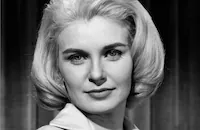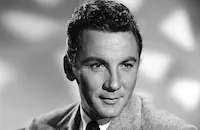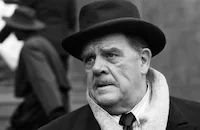No Down Payment

Brief Synopsis
Cast & Crew
Martin Ritt
Joanne Woodward
Sheree North
Tony Randall
Jeffrey Hunter
Cameron Mitchell
Film Details
Technical Specs

Synopsis
When electrical engineer David Martin and his ambitious wife Jean move into the Sunrise Hills suburban housing development, their neighbors, Herman and Betty Kreitzer, invite them to a barbeque. Also invited are Jerry Flagg, a shiftless, used car salesman who cloaks his disappointment with life in an alcoholic haze, Jerry's long-suffering wife Isabelle, Troy Boone, a crude, uneducated auto mechanic who glories in his past as a war hero, and Troy's sultry wife Leola. At the party, David comments that he feels fortunate to be able to buy a house, to which Jerry cynically replies that they are all at least twenty-five years in debt. When the drunken, lecherous Jerry asks Jean to dance and then clings to her suggestively, Isabelle runs home in tears. Later, at home, Jean prods David to leave engineering, a job he loves, for a higher paying position in sales. The next morning, Leola, restless, reproaches Troy for forcing her to give away the child she bore before they were married. When Leola pleads with Troy to have another baby, Troy, who has applied for the job of police chief, insists on waiting until he is hired. After Troy leaves for work, Leola sobs in silent desperation. Meanwhile, at the Markham used car lot, Jerry, bent on earning enough money to buy his son a new bike, pressures the Burnetts, a naïve, unsuspecting couple, into spending their last dollar on a used car. With the anticipated commission from the sale, Jerry insists on throwing a lavish party for the neighbors. Meanwhile, Herman, the manager of an appliance store, is asked by his Japanese employee Iko to help persuade the subdivision's developers to allow his family to move into the community. When Betty expresses reluctance to become involved in a racial controversy, Herman angrily criticizes her for claiming devotion to religious tenets while refusing to help fight racial intolerance. At the party that night, Jerry is boasting that easy credit and no money down is the secret to prosperity when Markham, his boss, appears at the door, furious that Jerry financed the Burnetts' loan through a usurious finance company. When Markham demands that Jerry immediately return the Burnetts' money, Jerry speeds away, drunk. As Isabelle and Herman drive off in search of Jerry, Troy invites Jean to his garage to view his war trophies and there confides that his war memories are the only thing keeping him alive. Leola, meanwhile, gets drunk and begins to babble about the baby Troy made her give away. After Troy hauls the squalling Leola home, Jerry returns and begins to jabber about his get-rich schemes, causing Isabelle to scream in frustration. The next day, Herman, the head of the City Council, tells Troy that he has been disqualified from the chief's job because of his lack of education. Troy, who had hoped to regain his former glory through the police chief's uniform, explodes and goes home, drunk and seething with resentment. After he accuses Leola of trying to pass off someone else's baby as his and then kicks in the television set, Leola flees and Troy goes to bed, bottle in hand. Some time later that night, Troy, intoxicated, menacingly lumbers into Jean's kitchen. David is away on a business trip, and Jean, helpless and alone, tries to fend off Troy's advances to no avail. After Troy rapes her, she runs in hysterics next door to Betty and Herman's house. When David returns home the next morning, Jean tells David that Troy raped her. Furious, David hurries next door to confront him, but Troy claims that Jean wanted to have sex with him. As Leola watches, the two men fight and Troy slugs David to the floor. David then returns home to reassure Jean that he still loves her. Denouncing Troy, Leola declares that she is leaving him, and when he tries to stop her, she pushes him away, causing him to fall underneath their car, which is supported only by a jack. When the car crashes down on Troy, David, hearing the commotion, rushes into the garage and raises the car with the jack, freeing Troy, who then dies in Leola's arms. The following Sunday, all the neighbors, including Iko, attend church while Leola climbs into a cab and drives out of town, passing a sign that reads "Happy Acres, the happy end to your house hunting."

Director

Martin Ritt
Cast

Joanne Woodward

Sheree North

Tony Randall

Jeffrey Hunter

Cameron Mitchell

Patricia Owens

Barbara Rush

Pat Hingle
Robert Harris
Aki Aleong
Jim Hayward
Mimi Gibson
Donald Towers

Charles Herbert
Frank Gerstle

Robert Burton
Bob St. Angelo
Mary Carroll
George Chester
Nolan Leary
Bill Murphy
Crew
L. B. Abbott
Al Baerthlein
Eli Benneche
Herman A. Blumenthal
Eli Dunn
Ruby Felker
Gaston Glass
Eugene Grossman
Leigh Harline
Kenny Honnold
Don Isaacs
Ann Kirk
Joseph La Shelle
Charles Le Maire
Harry M. Leonard
Louis Loeffler
Al Murphy
Lionel Newman
Ben Nye
Edward B. Powell
Dolores Rubin
Walter M. Scott
Sue Shannon
Rose Steinberg
Helen Turpin
Jerry Wald
Bob Weatherford
Lyle R. Wheeler
Merle Williams
Mary Wills
Philip Yordan

Videos
Movie Clip



Film Details
Technical Specs

Articles
No Down Payment
No Down Payment was based on John McPartland's 1957 novel, which producer Jerry Wald purchased before its publication by Simon and Schuster. 20th Century-Fox's interest in the novel created a buzz, and the book sold out its first printing according to a September 1957 article in The Hollywood Reporter . While the film's credits list screenwriter Philip Yordan as adapting McPartland's novel, the real writer was Ben Maddow, who had been blacklisted from working in films by the House Un-American Activities Committee. Yordan agreed to act as a "front" for Maddow so that the writer could continue to earn a living in secret. Ritt himself had been a target of the HUAC and blacklisted from television in the early 1950s during the height of the Red Scare. While in the East, Ritt had been asked to come to Hollywood to make No Down Payment by Fox production head Buddy Adler, but before he left for the coast Ritt had refused to appear before the committee voluntarily at the request of 20th Century-Fox president Spyros P. Skouras. He told Skouras "I haven't done anything I need to clear myself for. I have nothing to say to this committee. I've lived this long without doing anything I'm ashamed of and I'm just not going to capitulate." Skouras eventually backed down and labeled the accusations against Ritt as "a lot of shit." He told the director that he could go to Hollywood but that he'd "better make good pictures." By 1957, the influence of Joseph McCarthy was waning, although the blacklist wouldn't be broken until 1960 when director Otto Preminger announced that blacklisted writer Dalton Trumbo would write his film Exodus (1960) and Kirk Douglas announced that Trumbo had written Spartacus (1960).
Under the shadow of the blacklist and under the working title of Down Payment , No Down Payment began pre-production with the press reporting that Robert Wagner, Ben Gazzara and Dana Wynter would star, but all of them had left the project when Ritt shot the film from mid-April to early June 1957. In its posters for the film, 20th Century-Fox proclaimed the studio would be "Bringing You the Screen's Most Exciting New Stars!" These were Joanne Woodward, Cameron Mitchell, Tony Randall (in his first dramatic film role), Sheree North, Patricia Owens, Pat Hingle and former real-life married couple Jeffrey Hunter and Barbara Rush, who had divorced in 1955.
No Down Payment is set in Sunset Hills, a development of middle-class homes in California, where a car salesman, an appliance store manager, an engineer, an auto mechanic and their wives are living lives filled with reckless spending, infidelity, regret, jealousy and alcoholism that would eventually lead to sexual assault and death. The film also touches upon racism, when Iko (Aki Aleong) asks his store manager, Herman Kreitzer (Hingle) if he would give him a reference so he, too, could move to Sunset Hills with his family. Deeply religious Herman is shocked when his wife, Betty (Rush), doesn't want him to give the reference because she is worried about what the neighbors would think if a Japanese-American moved in. This, noted Daily Variety was a change from the novel, where the employee was African-American.
The film opened in New York on October 30, 1957 to mixed reviews. The Conference of Catholic Bishops called it "a soapy melodrama. [...] Director Martin Ritt tries to use the sudsy story of the couples to reflect the materialistic discontents and confusions arising from America's post-war prosperity, but the social message gets lost in the personal melodramas." Harrison's Reports , an industry publication, deemed it "an engrossing dramatic entertainment that should go over well with adult movie-goers. The characterizations are varied and interesting and, thanks to the expert direction, the players, most of whom are talented young stars developed by the 20th-Fox [sic] studio, come through with earnest and believable portrayals. Worthy of special mention is the performance of Joanne Woodward, who once again proves her exceptional dramatic talents."
The film would make back its costs, but it was by no means a box office hit. Nevertheless, the British Academy of Film and Television Arts (BAFTA) nominated Woodward for Best Foreign Actress and No Down Payment for Best Film from Any Source in 1959, despite the fact that the film was restricted to adult audiences in Britain due to its content and was banned outright in Ireland. Having the film banned in Ireland and Sweden reportedly infuriated Skouras, who blamed long-time production chief Darryl F. Zanuck for not toning down the more salacious bits.
No Down Payment novelist John McPartland had made a name writing pulp fiction full of lurid tales of suburban America, but his own life may have been the inspiration for his books. When McPartland died suddenly in Monterey, California, only 10 months after the release of No Down Payment , it was discovered that in addition to his legal wife and son in Mill Valley, he had a mistress who had given him five children in Monterey, whom the city had named "Mother of the Year."
Ten years later, in 1967, a young English rock musician named David Bowie received his first fan letter from an American, 14-year-old Sandra Adams of New Mexico. The then 20-year-old Bowie wrote to Adams, "I was watching an old film on TV the other night called No Down Payment. A great film but rather depressing if it is a true reflection of the American way of life. However, shortly after that they showed a documentary about Robert Frost the American poet, filmed mainly at his home in Vermont, and that evened the score. I am sure that is nearer the real America."
By Lorraine LoBianco
SOURCES:
Aaker, Everett Television Western Players, 1960-1975: A Biographical Dictionary
https://catalog.afi.com/Catalog/moviedetails/52301?sid=2d168afa-208b-4e6f-b159-19d5b72ebc19&sr=6.562723&cp=1&pos=0
Buhle, Paul and Wagner, Dave Hide in Plain Sight: The Hollywood Blacklistees in Film and Television, 1950-2002
"No Down Payment" Catholic News Service Media Office n.d.
"No Down Payment" Harrison's Reports 5 Oct 57
The Internet Movie Database
Jackson, Carlton Picking Up the Tab: The Life and Movies of Martin Ritt
http://www.tcm.com/tcmdb/title/85078/No-Down-Payment/notes.html
Todd, Ben "David Bowie's 1967 Letter to First Ever U.S. Fan Unearthed" The Daily Mail 8 Jan 10

No Down Payment
Quotes
Trivia
Notes
The working title of this film was Down Payment. According to a January 1957 Los Angeles Times news item, producer Jerry Wald acquired the rights to John McPartland's novel prior to its publication. The studio's acquisition of the novel boosted interest in the book, causing it to sell out its first printing, according to a September 1957 Hollywood Reporter news item. According to the Daily Variety review, in the novel, the ethnic identity of the family desirous of moving into the housing development was African American, not Japanese as in the film.
As noted in the Los Angeles Times item, Robert Wagner and Ben Gazzara were being considered to play the leads in the film. An April 1957 Los Angeles Examiner news item adds that Dana Wynter was hired for one of the top female roles. Although a Hollywood Reporter production chart places Richard Cutting, Philo McCullough and Edith Claire in the cast, their appearance in the released film has not been confirmed. A May 1957 Hollywood Reporter news item adds silent film director George Melford to the cast, but his appearance in the released film also has not been confirmed.

Miscellaneous Notes
Voted Best Actress (Woodward) by the 1957 National Board of Review (shared with her work in "The Three Faces of Eve").
Released in United States Fall October 1957
CinemaScope
Released in United States Fall October 1957













